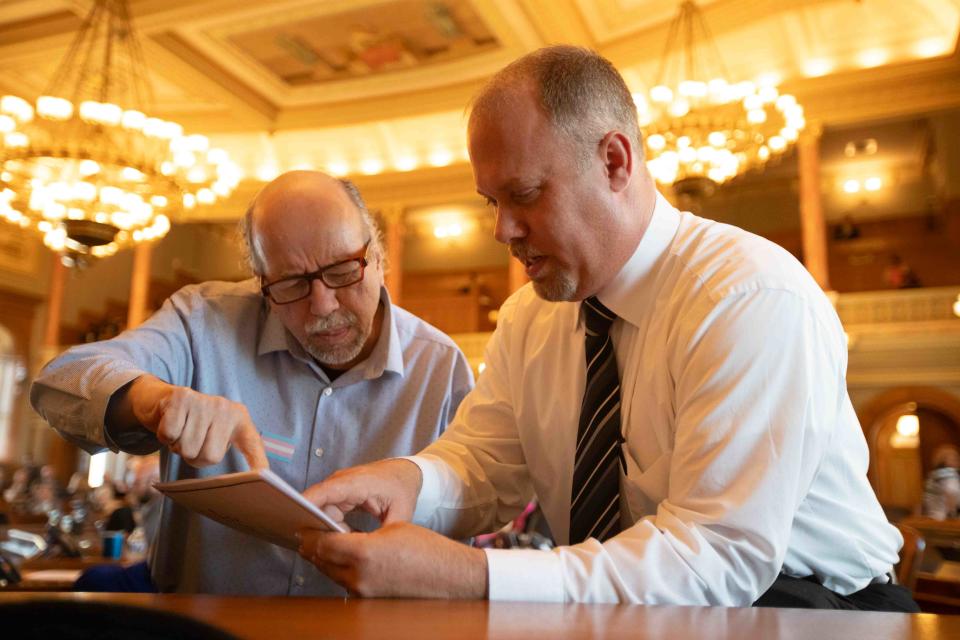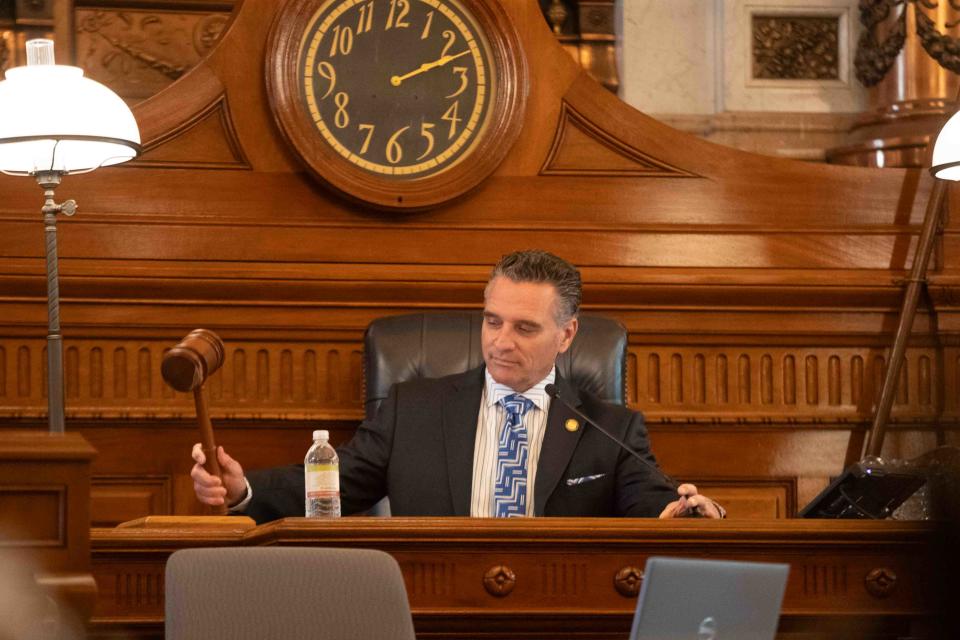Will Kansas have major tax cuts in 2024? Lawmakers fail to override Laura Kelly veto
- Oops!Something went wrong.Please try again later.
The prospect of major tax cuts is now unclear after lawmakers failed to override Gov. Laura Kelly's veto of a substantial tax cut package.
While a bipartisan supermajority in the House overrode Kelly's veto on Friday, bipartisan opposition in the Senate killed House Bill 2036. The bill was a collection of cuts to income taxes, property taxes and sales taxes, but Kelly considered it too expensive.
"I appreciate that the Kansas Senate has prioritized our state's future fiscal stability by upholding my veto," Kelly said in a statement after the Senate's vote. "As I've said before, Kansans need meaningful sales, property, and income tax relief, but we must ensure any tax relief is responsible and sustainable. Now, I urge the legislature to consider the alternative tax cuts package I proposed last week to ensure that Kansans get the relief they desperately need."
Republican lawmakers showed little interest in taking up Kelly's proposal when she unveiled it last week, instead choosing to focus on overriding the veto. Because the Senate killed the bill, it can't be sent back to conference committee to amend a plan more amenable to senators and the governor.

What happened in the Senate?
In the House, the tax reform attracted significant support from Democrats, but the Senate was harder to budge.
The House vote was 104-15 vote, with a majority of Democrats siding with all Republicans. The Senate was 26-14 as three Republicans sided with the Democrats.
Those same three Republicans — Sen. John Doll, R-Garden City; Sen. Dennis Pyle, R-Hiawatha; and Sen. Rob Olson, R-Olathe — broke with their party early in the legislative session to support a previous Kelly proposal.
Sen. Caryn Tyson, R-Parker, said the tax plan was crafted through listening and working with people, but the senators who voted against it are effectively saying, "It's their way or the highway; they're not compromising."
Senators response mirrored criticisms by the governor. Democratic opponents said the bill will make it likely that the state will have to tighten its budget in a couple years, which the Legislature is often unwilling to do.
The bill was projected to reduce revenues by $469 million a year by 2029. Her proposal in the same period is about a $433 million reduction in revenues.

Senate Minority Leader Dinah Sykes, D-Lenexa, pointed to the $125 million increase in the budget for 2025, and that there are still priorities for special education funding, transportation and addressing the growing waitlist for intellectual and developmental disability waivers.
"I have been in this chamber where we've cut funding and we've cut budgets and we've made those hard decisions and I don't want to go back to that," Sykes said.
The criticism frustrated Republicans, who viewed the spending difference as trivial in a tax cut this size.
“These plans, whether it’s the minority leader’s amendment or the governor’s plan they proposed, the plans that have come out of this chamber with bipartisan supermajorities, they’re a fraction of a percent apart," said Senate President Ty Masterson, R-Andover. "It might sound like a lot of money outside of the building, $40-$50 million, but in the scope of our $10-plus-billion general fund, our $20 billion all-funding, somehow that difference is the difference between sustainable and all-out devastating. The truth is they’re either both sustainable or they’re both not."
Republicans and governor haven't been on same page on tax cut ideas
Tax cuts were the top priority for Republicans this year, and there have been three separate proposals sent to the governor this session. The governor flatly rejected the first one for including a flat tax, which taxes all incomes at one rate rather than a tiered progressive tax structure. The latest proposal removes the lowest income bracket, changing Kansas’s tax structure from three brackets to two.
The other provisions on property tax relief, standard deduction increases and Social Security taxes are popular with both parties.
With the legislative session scheduled to end Tuesday, it is unclear if lawmakers will take up Kelly's proposal or make another attempt at cutting taxes before leaving Topeka. If that happens, Kelly could call a special session.
"I will not let legislators leave Topeka this year without meaningfully and responsibly cutting taxes for middle-class families," Kelly said earlier this session. "I will call a special session if I have to."
This article originally appeared on Topeka Capital-Journal: Tax cut bill fails in Kansas after lawmakers don't override veto

